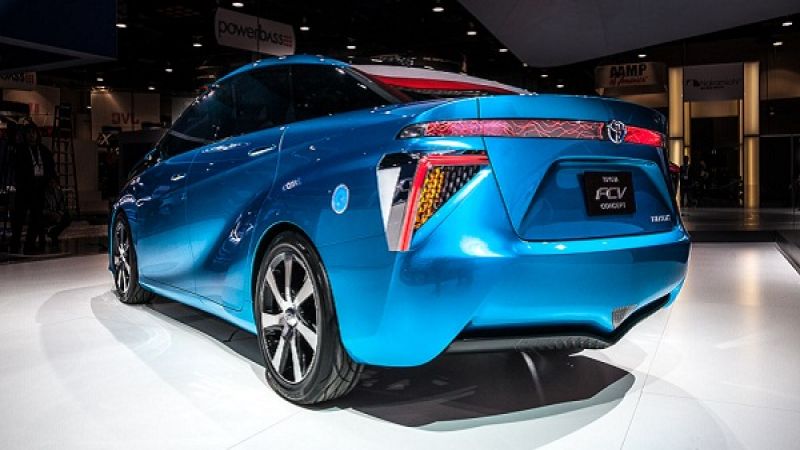This week Toyota’s senior vice president Bob Carter came right out and said it: a full tank of compressed hydrogen capable of propelling Toyota’s upcoming fuel cell vehicle 300 miles will cost $50.
Carter told the JP Morgan Auto Conference in New York that this cost to refuel will fall to $30 ‘in time,’ as Ecomento reported. Neither figure inspires a great deal of optimism for the future of hydrogen vehicles, for a very obvious reason.
More expensive than gasoline
The estimates put forth by Toyota work out to 17 cents per mile to refuel the first hydrogen-powered vehicles, and 10 cents per mile under the vague future scenario.
To put these numbers in perspective, a typical family sedan averaging 25 mpg costs 16 cents per mile even with gas prices at $4 per gallon.
Looking forward to the suggested $30 target to power a fuel cell vehicle for 300 miles, hydrogen appears to come out on top. Consider, though, that by the time this scenario manifests itself the average gasoline vehicle will be considerably more efficient than it is today. If this hypothetical gas-powered vehicle gets 40 mpg, it will cost exactly the same as hydrogen to refuel it – 10 cents per mile.
Of course, that assumes gas prices stay the same (they won’t.) But then consider that Toyota’s own Prius already gets 50 mpg, and that number will increase with the next generation. Right now, at $4 per gallon a Prius costs 8 cents per mile to refuel. That’s less than half the estimated cost of hydrogen.
Far more expensive than electricity
You can almost hear the EV advocates cackling with glee: so, how do the estimated hydrogen costs compare with electricity? If you’re in the fuel cell camp, avert your eyes.
Electric vehicle ‘fueling’ costs, if charged at home, range from 2 to 5 cents per mile depending on the efficiency of the vehicle and the cost of electricity. If you drive a BMW i3 and charge it at off-peak hours, you probably are close to the low end. A Tesla Model S charged at standard electricity rates comes in near the high end – which is still less than one-third the current cost of compressed hydrogen, and half the cost of hydrogen’s optimistic future scenario.
Charging at public stations is a different story, as some are free (most prominently Tesla’s superior Supercharger network) but many charge higher rates than you would pay at home.
Speaking of free, Hyundai recognized that its early adopters wouldn’t want to pay more than gasoline to fuel their futuristic hydrogen fuel cell vehicles. The company is giving fuel cards to everyone who leases the new Tuscon FCEV, which is available for 3 years at $499 per month. Takes care of that problem for the time being, but clearly isn’t viable in significant volumes.
Will there be significant volumes?
Not for a long time, and only under the absolute best-case scenario for hydrogen. The price of hydrogen fuel is a big hurdle to acceptance of fuel cell vehicles alongside cost of the car itself, limited refueling infrastructure, and questionable carbon emissions reduction due to the processes necessary to obtain and transport pure hydrogen.
Let me rephrase that: there won't be any emissions reduction from use of hydrogen as far into the future as we can reasonably speculate. This is mostly because 95% of our hydrogen is produced by natural gas, and using carbon-free electricity sources to produce it so it can be converted to electricity to power a vehicle is downright foolish when that electricity could simply be routed directly into the battery of an electric vehicle.
Quite frankly, the refueling costs confirm that there are few real benefits to driving a fuel cell vehicle. Yes, they can go farther and refuel more quickly than electric vehicles – but relative to conventional gasoline cars, the only advantage they have lies with the electric powertrain shared by their EV brethren. They are more expensive up-front (Toyota’s new fuel cell vehicle will cost around $70,000), are no cheaper to fuel, provide minimal carbon footprint reduction, and can only be refueled in a few places.
Of course, all of these disadvantages could change. Most infrastructure will be built and costs will inevitably come down, as we are still only seeing the first commercially produced hydrogen-powered vehicles. But the foreseeable future of fuel cell cars doesn’t look all that good.
Set Torque News as Preferred Source on Google












Comments
Hmm... sounds very familiar.
Permalink
Hmm... sounds very familiar. Could this be what naysayers said about the cost of batteries in BEVs? Nahhh... couldn't be.
By the way, there is one huge
Permalink
By the way, there is one huge nail that kills the whole "fuel cells are a waste compared to battery electrics" argument.. the fact that more mainstream automakers are working on FCEVs than are working on BEVs. If fuel cells are such crap, why are there so many manufacturers involved with them? Hmm...
I mean, after all, if we're to believe that global warming is happening because a large number of scientists say it is and fewer say it isn't.. doesn't the same argument hold true for fuel cells being superior? After all, more automakers say it will work than say it won't. Right? There's a CONSENSUS of automakers, as it were, so it must be the best solution.
97% is a consensus. I don't
Permalink
In reply to By the way, there is one huge by Aaron Turpen
97% is a consensus. I don't think you can say the same about the auto industry...and there is a big difference between "working on it" and producing a product that anyone wants to buy. As long as fuel cells offer no advantages over gasoline, and only a temporary advantage over battery electrics (fueling time/range) there is no reason to believe they will succeed.
"97%" according to the IPCC,
Permalink
In reply to 97% is a consensus. I don't by Luke Ottaway
"97%" according to the IPCC, most of whom were not scientists. That number's been debunked several times over.
Now, back to hydrogen. Again, if a "consensus" of participants agree, then obviously it's the way to go. Right? Since more are doing hydrogen than battery electrics, there's a consensus. Right?
If consensus is defined as
Permalink
In reply to "97%" according to the IPCC, by Aaron Turpen
If consensus is defined as "general agreement," then whatever the auto industry thinks about hydrogen is most definitely not a consensus. I think you're thinking of "majority."
OK, so let's analyze how many
Permalink
In reply to If consensus is defined as by Luke Ottaway
OK, so let's analyze how many automakers are working on fuel cells. If most of them are in tacit agreement, as defined by their participation in the tech, then it's a consensus. Looking at automakers as volume sellers (more than 1 million units annually), there are about 21 automakers in the world. Of those 21, 15 are actively working on fuel cell technology either on their own or in conjunction with others and 3 (all Chiense makes) are utilizing fuel cells from other makers. That's 18 of 21 or 86 percent of all automakers. That seems like a consensus to me. If it's not a consensus and merely a "majority," then you need to inform the IPCC, the US National Academy of Sciences, and the AMS that they are using the term incorrectly in their statements on climate change.
Again, "working on" fuel
Permalink
In reply to OK, so let's analyze how many by Aaron Turpen
Again, "working on" fuel cells does not mean much at all. There is very little chance any of the automakers, most of whom keep their fuel cell programs around without any expectation of real results (speaking from my experience at Ford here), will actually come out with a fuel cell vehicle that offers any advantage over EVs or gasoline. There are a lot of people "working on" cold fusion too...so again, I will dispute the term consensus if it is applied to an actual belief in the potential success of fuel cells. In that category, you can only truly name a few automakers while questioning the reasoning of their leadership.
*sigh* 15 automakers plan to
Permalink
In reply to Again, "working on" fuel by Luke Ottaway
*sigh* 15 automakers plan to introduce cars in the next three years. Period. That's the top argument against fuel cell detractors. If they aren't important, why are so many carmakers working on them? Why would they waste resources keeping these programs without expectation of result? What's the gain?
Four very important letters:
Permalink
In reply to *sigh* 15 automakers plan to by Aaron Turpen
Four very important letters: CARB. If any automaker legitimately expects to sell volumes greater than compliance levels, they're going to have quite the rude awakening. The larger point remains...the only advantage fuel cells have or will have over gasoline is the electric drivetrain, and the only advantage they have or will have over EVs is range and refueling time, an advantage which will be largely eroded by the time hydrogen infrastructure makes fuel cell vehicles remotely viable.
All major car manufacturers
Permalink
In reply to *sigh* 15 automakers plan to by Aaron Turpen
All major car manufacturers are working on FCVs and many have BEV programs but that does not mean they will ever offer them for sale/lease. There is a Hugh difference between "Technically" viable and "Economically" viable. Today FCVs are not cost completive with BEVs. It is too early in the development of FCV technology to expect hydrogen to have any impact on gasoline sales. Maybe in the mythical future. FCVs are only 1 or 2 battery advancement away from being obsolete. Right now Tesla has already addressed the rapid recharge rate and range issues we hear so much about. BEVs that can be charged rapidly will be the cars that apartment dwellers will choose.
If we look back a few years
Permalink
In reply to All major car manufacturers by mike w (not verified)
If we look back a few years "Peak Oil" was a concern and climate change was also becoming more widely known. A need for an alternative to petroleum power was needed.
Batteries weren't very good. Fuel cells looked promising. Any car company that wanted to have a future most likely started parallel programs, perhaps even put more emphasis on fuel cell technology. Oil prices were going through the roof so hydrogen would be affordable in comparison.
But battery technology did improve and rapidly due largely to demands for more battery life from computers and phones. Batteries started pulling ahead and right now several car companies have one or more electrics on the road. Other companies have strong prototypes developed, most likely waiting for battery prices to drop a bit more before they fully commit.
Two evolutionary branches sprouted out from the tree of cars. It looks like the EV branch with thrive, and if it does, the fuel cell branch will wither. It's just economics.
Rechargeable batteries only
Permalink
Rechargeable batteries only take a charge for so long. There is no mention of the cost and inconvenience of replacing that large battery. I am an environmental scientist (by day) and the issue of disposing of all those used batteries would likely become a problem as well. There is always ups and downs to every new technology. This article also talks about gasoline engines as if gasoline was a renewable resource. There is a reason we are looking for alternatives.
A lot of fuel cell detractors
Permalink
A lot of fuel cell detractors focus on the cost of infrastructure development and the fact that people can just pull the BEV car into their garage and plug it in with no or very little infrastructure investment. I suppose if you are among the many North Americans who live a very privileged and inefficient lifestyle, you live in a single family home with a 2+ car garage.
Unfortunately, in many higher-density areas, many people cannot afford such luxury. Such a house in my city costs over a million dollars, even for a tear-down. Those renting basement suites typically need to park on the street, or a driveway without access to electrical outlets. The same is true of many rental apartments.
For condo owners, good luck getting your strata to approve and install your charging plug in the parking garage. The cost is not really prohibitive; but having a bunch of bored gray-haired busy-bodies humming and hawing over your plug installation request may keep you caught up bureaucratic red tape for years.
Thankfully some newer condo buildings are being built with charging infrastructure built in. But for many of us who choose not to live in a single-family dwelling with 2+ car garage, built on prime farmland, an hour+ drive from work or any culture center/activity... in short, these people are stuck with ICE cars until a non-plug in zero-emission vehicle option comes along.
About 50% of all US drivers
Permalink
In reply to A lot of fuel cell detractors by JMO (not verified)
About 50% of all US drivers have an outlet to plug into where they park. 16% have an available at work.
Those people who park at the curb and other more difficult places to access are likely to find outlets at work or school. And with the rapidly dropping price of solar they should get some sweet charging rates by letting the utility control the actual timing of charge. That makes them a valuable dispatchable load.
JHO - over 50% of all US
Permalink
In reply to A lot of fuel cell detractors by JMO (not verified)
JHO - over 50% of all US drivers have an available outlet where they park. Apartments and condos are starting to add them, are even being required to include charge outlets with new construction.
The place where many my charge is where they park for work or school. As solar grows on our grids it will serve as a low cost source for daytime charging and EVs can serve as dispatchable loads, lower the grids need for storage. Just dump extra power into car batteries.